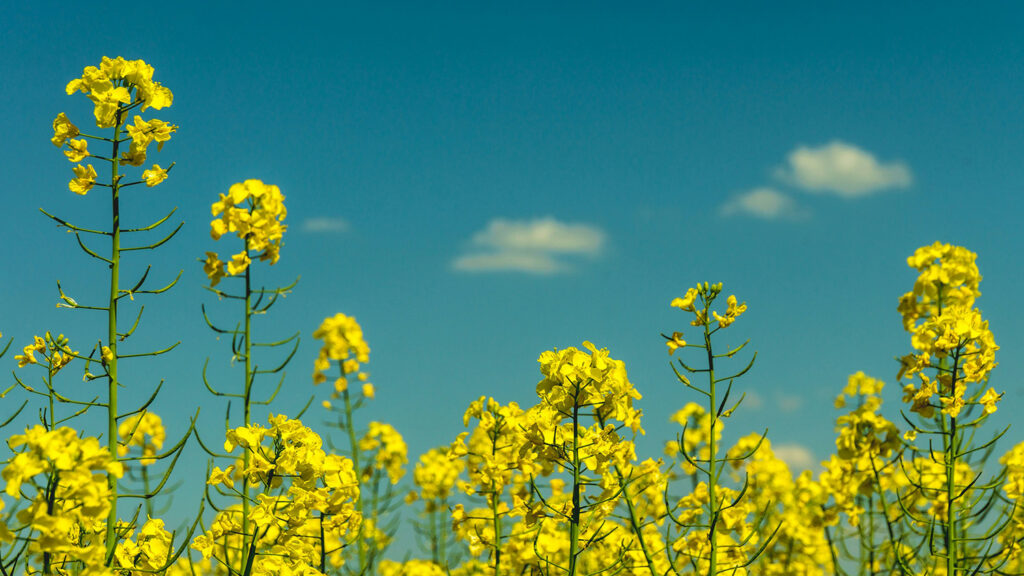Transfiguration, Sisters, Oregon
June 16, 2024
Mark 4:26-34
Rev. Canon Marianne Wells Borg
Today’s Gospel is the parable of the mustard seed. All too familiar perhaps. I wasn’t raised in the church but by the middle of childhood the story of the mustard seed found its way to me beyond church walls.
What I remember was that if you have faith the size of a mustard seed, great things can happen. With faith, even the size of a little mustard seed, great things can happen. What an idea. What a word of encouragement. And I remember necklaces with a dangling little round globe and an even littler mustard seed floating inside. Do you remember those? I wanted one.
So I thought the mustard seed was about the wonder working power of even a little faith. Sound familiar?
But as I read this parable now, I see it a bit differently. I will share my take on this parable with you in a moment. But first, a review of what a parable is. Since parables were Jesus’ preferred way of teaching.
Parables are short, memorable stories. We can agree on that. They use common images from the everyday that hearers would be familiar with. Images that can also have more than one meaning.
Parables are not journalistic reports. They didn’t really happen. They are stories about what didn’t really happen. But that doesn’t mean they aren’t telling a truth. They tell a truth but they tell it slant.
As Emily Dickinson wrote: Tell the truth but tell it slant, the truth in circuit lies. (Circuitously; tell it indirectly.) The truth must dazzle gradually or every one be blind.
Jesus’ parables are stories told at a slant. And we may not know what to make of them right away.
And parables are not tidy little moral tales for us to figure out. Although we tend to work hard saying that they are.
And there isn’t just one way to interpret a parable or even a right way. Although they may lead us to question what we have always assumed is the right way. They don’t tell us what to do. They don’t give us an answer. Or explain themselves. So why the parable? What good can come out of a parable?
Well, they invite us to come and see. See again. See from another point of view. From another angle of vision. They just might blow the dust from our eyes, as we continue to travel along the way.
Parables by the way are not about God. I know, I thought they were about God too. How often do we hear or read a parable and ask, now who is God in this story? But Jesus’s parables are not about God, they are about the kingdom of God. The kingdom of God.
And I suggest the kingdom of God is not a place. I know, I thought the kingdom of God was a place too. But I am coming to see that the kingdom of God is rather about what is taking place, what is going on, what is happening in the story, in our lives, that is worthy of the name of God. The kingdom of God is a way of life. A way of being. That can take place anywhere. And parables describe what that might be like. Albeit at a slant.
The kingdom of God, then, is something to be experienced. And we do so in how we treat one another. In how we think of one another. How we act and care for one another. And the world. The kingdom of God is not something that comes down from the sky as a ready made. Or will at the end of time. We are the ones that make the kingdom of God real. We are its witnesses and participants. The kingdom of God is what is happening, what is happening here, now, that is worthy of the name of God. And that is yet to come.
Does this make sense?
And remember that Jesus spoke about the kingdom of God as a sharp contrast to the kingdom of Caesar, the kingdom of Empire. The kingdom of Empire was the oppositional context of Jesus’ day. And Jesus’s parables, in their own way, illustrate the contrast.
The Kingdom of Empire is characterized by winners and losers, insiders and outsiders, clean and unclean, righteous and unrighteous and wouldn’t hesitate to use exploitation or domination or violence to keep people in their place.
The kingdom of God by contrast welcomes the outcast, the sick, the poor, the nobodies. It doesn’t judge the “sinner.” It doesn’t resort to violence. In the kingdom of God everyone matters. Everyone’s well being matters. To have a safe place matters. To be sure everyone has enough matters. When life is seen through the lens of the kingdom of God even “the least of these” is a pearl of great price. Of great value in a world that says you are not worth anything. In a world that says
you don’t really matter. Or belong. To have an experience of the kingdom of God is like seeing yourself again, as if for then first time.
In the kingdom of God there is a place for everyone. Anyone. The kingdom of God is a safe home.
Come unto me. All that are heavy laden, come unto me. And you will find rest for your souls.
So, “to what can we compare the kingdom of God?” asks Jesus. A mustard seed. A mustard seed? What are we to make of that?
The mustard seed is “the smallest of all the seeds on earth; yet when it is sown it grows up and becomes the greatest of all shrubs,” says Jesus.
The greatest of all shrubs. Which will average about four feet high. Arguably a modest claim. I can’t help but smile at Jesus saying this. I wonder if he did too. Perhaps this is humorous hyperbole.
Matthew who also makes use of this parable didn’t settle for that. He says the mustard seed will actually become a tree. No, the mustard seed can’t become a tree. It is a shrub.
This is a very common plant in the region. It can be found anywhere. It is a weed, you know. It can spread anywhere. And where it is not welcomed. It is considered a nuisance. And can interrupt and disrupt a proper garden or designated field. Its branches can provide shade for birds. But it is a modest refuge. And a temporary refuge at that. Mustard plants are annuals. They need planting again and again.
What to make of the kingdom of God being like the greatest of all shrubs.
Like Matthew I think many of us have tended to mix up the growth of the little mustard seed with the mighty cedar of Lebanon. Which our reading from Ezekiel references. The mighty cedar of Lebanon crowned the spine of mountains along the eastern Mediterranean. They were towering. And had bulk. And seemed to be everlasting. They were magnificent. A wonderful metaphor for greatness. Lasting greatness. Ah, the lofty noble cedar.
But that image is a symbol for Empire. And the boasts of Empire: mighty, a crowning glory. And remember the prophet Ezekiel’s warning in our reading: the Lord will bring low the high tree.
I think these contrasting images, the towering noble cedar and the four foot shrub, are at play in Jesus’s parable, even though the cedar is not referenced in Mark’s reciting of the parable. But the hearer’s of Mark’s gospel would have known that image of the noble cedar as an image for the kingdom of Empire. I have no doubt to hear the kingdom of God as the greatest of all shrubs would be recognized as humor or irony or burlesquing the kingdom of Empire. The kingdom of
Empire boasts. The kingdom of God is common, modest, humble, can spread anywhere, and ruin someone else’s garden.
So much for the grandiose pretensions of Empire! So much for the grandiose pretensions of human greatness. So much for the noble cedar. But how about that unruly little shrub! We might laugh at this. The hearers of this parable might have. Bur Empire would grimace.
This is where the parable now has gotten my attention. I thought the parable was primarily about faith. Now I wonder if the parable isn’t about greatness. And what greatness looks like. Human greatness and God’s greatness.
If we want to make our world great, what does that look like? What are we talking about?
The parable suggests that the greatness of the kingdom of God is not what you expect.
The early Jesus communities grappled with this.
Listen to this passage from Paul’s letter to the Corinthians. (From 1 Cor.1: 18-34) A letter written before any of the Gospels.
“Has God not made foolish the wisdom of the world?… For the foolishness of God is wiser than human wisdom, and the weakness of God is stronger than human strength.”
(We could use this as a commentary on the parable of the mustard seed. The foolishness of God is wiser than human wisdom. The weakness of God is stronger than human strength… Grandiose human pretensions are not always worthy of the name of God.)
Paul goes on:
“God chose then weak things of the world to shame the strong. God chose the lowly things of this world and the despised things to nullify things that are…”
A shrub to nullify a mighty oak…I never would have imagined that.
Paul concludes:
Jesus is the wisdom of God. Jesus is the wisdom of God.
Jesus. He is our intuition about God, what God incarnate would be like: Jesus who cared about all humanity, loved and healed, rose up against systematic injustice and economic exploitation, risked it all for a better world; a better world worthy of the name of God.
What is it to be great? What do we think? What do you think?
I am reminded of the prayer by the great Jewish theologian of the last century, Abraham Heschel. “I did not ask for success,” he writes. “I asked for wonder. And you gave it to me.”
I did not ask for success. I asked for wonder. What do we make of that? Would such a prayer be ours? I dare say such a prayer leaves room for God.
Heschel also writes:
“Our goal should be to live life in radical amazement; [to] get up in the morning and look at the world in a way that takes nothing for granted. Everything is phenomenal; everything is incredible; never treat life casually. To be spiritual is to be amazed.”
To be amazed. Is that not our response to the great gift of life that is ours? Amazement. Wonder. Gratitude. So how to love this gift of life? There is our greatness.
As church we too often stumble over our own hope. We stumble over our own hope.
Maybe this parable is about faith. Faith in what Paul calls the weakness of God. Faith in “the shrub.” Faith in what may seem common and small and insignificant to the fatigued eye, to the eye that has forgotten to consider the lilies of the field, to the eye that has been blinded by streets paved with gold. Faith is surprise. Is wonder. Is trust in what we cannot yet imagine.
Great things can come from humble and even troublesome beginnings and endings. Great things can emerge even when the landscapes of our lives are parched or blood stained or darkened. Great things can yet happen. And do. A rose in the desert. Birdsong in a battlefield. The return of the sun after an eclipse. Greatness can arise anywhere.
So, hope for great things. Have faith that great things are to come. But we must ask, we must ask, what do we mean by great?




I have pulled a lot of mustard plants where they have grown nearly as tall as me in soybean fields. I have led a very simple life~ but have been given great gifts by friends who have encouraged me over the years. A follower of yours has brought me to you. She is very physically ill~ but has faith like a mustard seed. I am thankful to her, blessed by her kindness and your thoughtful teaching. Thank you!
I appreciate a new perspective about these familiar verses. We all need those who give us new ideas and understanding on some of our past interpretations. The faith process allows all of us to be open and expectant for further growth and insight.
Thanks for sharing this sermon.
Oscar J. Sorlie
Just a note to thank you for the sermon on the mustard seed–and for your Second Saturday series. I have been sampling the last couple of years’ worth: Brandon Scott, John Caputo, John Dominique Crossan, Barbara Brown Taylor. Hard to say who my favorite is.
Just a note to thank you for the sermon on the mustard seed–and for your Second Saturday series . I have been sampling the last couple of years’ worth.: Brandon Scott, John Caputo, John Dominique Crossan, Barbara Brown Taylor. Hard to say who my favorite is.
Love it Marianne…puts life in perspective…
seeing the magnificent in the small…
the World in the mustard seed.
Love, Pamela
Marianne, you always open my mind to new thoughts and information. I have a small mustard seed, given to me by a friend during a difficult time. At the time, it gave me faith that things would get better. After reading your sermon it has so much more meaning to me. Thank you for your wise words and continuing the important conversation you and Marcus started years ago.
Profound insight! So helpful an explanation and re-mind-er. I love the way you think, dig, explain, compare, grapple with Biblical truth! Always fresh, deep, eye-opening! Thank you!
The kingdom is like a weed. Invasive, resilient, constantly spreading, virtually impossible to get rid of. It is something that those who wish for order and discipline despise.
That’s part of the good news.
Great sermon. Our men’s book group at Christ Church in Whitefish Bay is reading Mark. I had not read all of Mark since my Concordia days when we read it in the NT class. As I’m rereading Mark for the first time in years, the lectures by Dr. Svendsbye come back to me (still looking for my class notes that are packed away in a box, somewhere). The disciples don’t appear to understand the parables and require special teaching and, from Mark’s literary style, the disciples don’t know who Jesus is. But, the evil spirits and the Roman legionnaire keep saying Jesus is the son of God. It reminds me of the saying that the Kingdom of God is spread around us but we see it not. We have to wake up (like the Buddha) to see it. There is a quote from the Hopi nation (I read it on the St Alban’s webpage as posted on Facebook) in which Mother Earth suggest to God to hide something in the human heart where they will find it when they are ready for it. By the way, I lead the discussion of Mark Chapter 4 and as a handout I gave everyone the preface to Mark in Marcus’ Evolution of the Word.
Marianne,
I love your explanation about parables and especially about the Kingdom of God. Let’s hope that great things will come, eventually, maybe not in our lifetime, but they will come. I have faith.
Thank you for your thoughtful sermon.
Sylvia
Beautiful, marvelous slant on this mighty but not-so-cedar-like shrub of a parable that preaches like a weed. Thank you for this thoughtful and provocative weedy sermon … many kudos.
Yes! In this week of the first 2024 presidential debate my hope for greatness is this: A leader who looks for ways to make the branches of every scruffy mustard bush burst with fertility of dreams that can be translated into reality.
I enjoyed your take on this reading as I too had to step in and preach as our priest was called away for the day. Your sermon is very different from mine but with similar conclusions
I really like your approach and so consistent with what Marcus wrote.
Thank you.